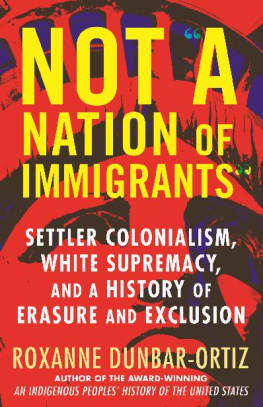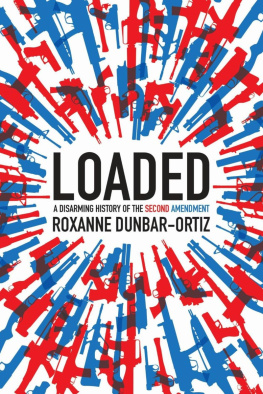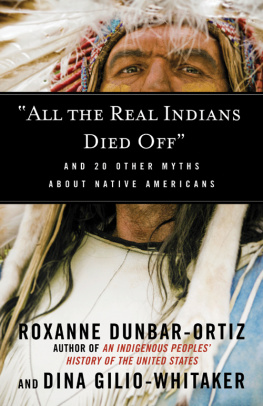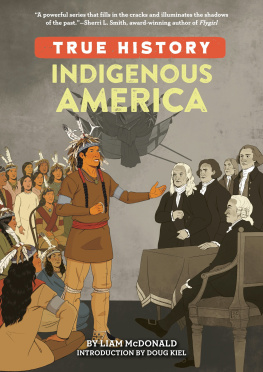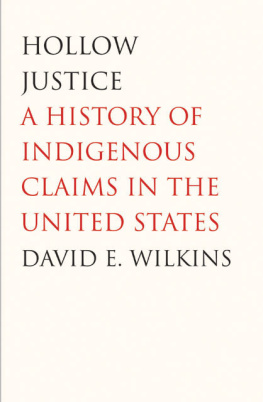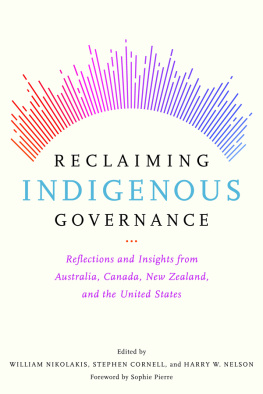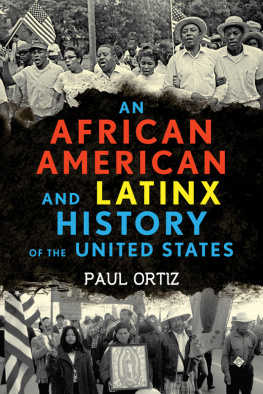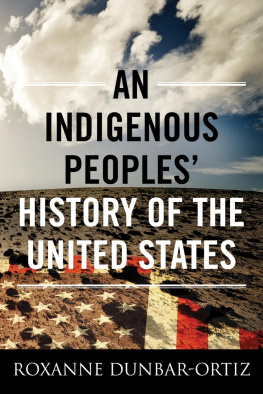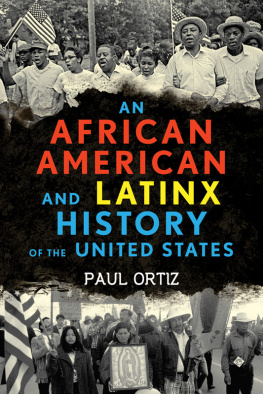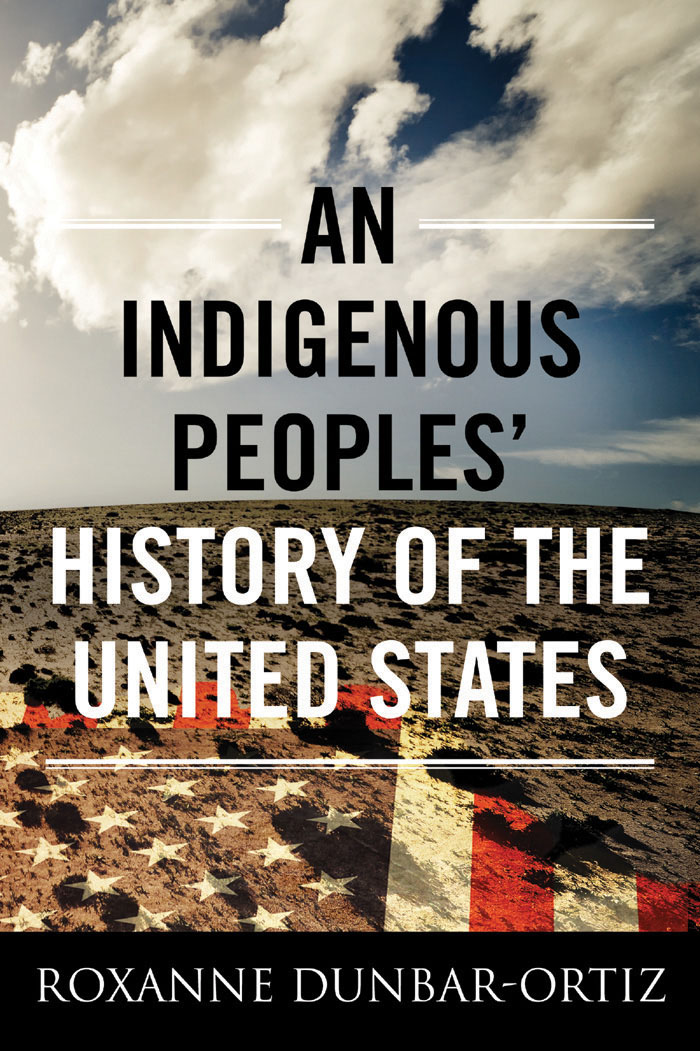PRAISE FOR
AN INDIGENOUS PEOPLES HISTORY OF THE UNITED STATES
In this riveting book, Roxanne Dunbar-Ortiz decolonizes American history and illustrates definitively why the past is never very far from the present. Exploring the borderlands between action and narrationbetween what happened and what is said to have happenedDunbar-Ortiz strips us of our forged innocence, shocks us into new awarenesses, and draws a straight line from the sins of our fatherssettler-colonialism, the doctrine of discovery, the myth of manifest destiny, white supremacy, theft, and systematic killingto the contemporary condition of permanent war, invasion and occupation, mass incarceration, and the constant use and threat of state violence. Best of all, she points a way beyond amnesia, paralyzing guilt, or helplessness toward discovering our deepest humanity in a project of truth-telling and repair. An Indigenous Peoples History of the United States will forever change the way we read history and understand our own responsibility to it.
BILL AYERS
Dunbar-Ortiz provides a historical analysis of the US colonial framework from the perspective of an Indigenous human rights advocate. Her assessment and conclusions are necessary tools for all Indigenous peoples seeking to address and remedy the legacy of US colonial domination that continues to subvert Indigenous human rights in todays globalized world.
MILILANI B. TRASK, Native Hawaiian international law expert on Indigenous peoples rights and former Kia Aina (prime minister) of Ka La Hui Hawaii
Justice-seekers everywhere will celebrate Dunbar-Ortizs unflinching commitment to trutha truth that places settler-colonialism and genocide exactly where they belong: as foundational to the existence of the United States.
WAZIYATAWIN, PhD, activist and author of For Indigenous Minds Only: A Decolonization Handbook
Roxanne Dunbar-Ortizs An Indigenous Peoples History of the United States is a fiercely honest, unwavering, and unprecedented statement, one that has never been attempted by any other historian or intellectual. The presentation of facts and arguments is clear and direct, unadorned by needless and pointless rhetoric, and there is an organic feel of intellectual solidity that provides weight and inspires trust. It is truly an Indigenous peoples voice that gives Dunbar-Ortizs book direction, purpose, and trustworthy intention. Without doubt, this crucially important book is required reading for everyone in the Americas!
SIMON J. ORTIZ, Regents Professor of English and American Indian Studies, Arizona State University
An Indigenous Peoples History of the United States provides an essential historical reference for all Americans. Particularly, it serves as an indispensable text for students of all ages to advance their appreciation and greater understanding of our history and our rightful place in America. The American Indians perspective has been absent from colonial histories for too long, leaving continued misunderstandings of our struggles for sovereignty and human rights.
PETERSON ZAH, former president of the Navajo Nation
This may well be the most important US history book you will read in your lifetime. If you are expecting yet another new and improved historical narrative or synthesis of Indians in North America, think again. Instead Roxanne Dunbar-Ortiz radically reframes US history, destroying all foundation myths to reveal a brutal settler-colonial structure and ideology designed to cover its bloody tracks. Here, rendered in honest, often poetic words, is the story of those tracks and the people who survivedbloodied but unbowed. Spoiler alert: the colonial era is still here, and so are the Indians.
ROBIN D. G. KELLEY, author of Freedom Dreams
Roxanne Dunbar-Ortiz writes a masterful story that relates what the Indigenous peoples of the United States have always maintained: against the settler US nation, Indigenous peoples have persevered against actions and policies intended to exterminate them, whether physically, mentally, or intellectually. Indigenous nations and their people continue to bear witness to their experiences under the US and demand justice as well as the realization of sovereignty on their own terms.
JENNIFER NEZ DENETDALE, associate professor of American studies, University of New Mexico, and author of Reclaiming Din History
In her in-depth and intelligent analysis of US history from the Indigenous perspective, Roxanne Dunbar-Ortiz challenges readers to rethink the myth that Indian lands were free lands and that genocide was a justifiable means to a glorious end. A must-read for anyone interested in the truth behind this nations founding and its often contentious relationship with indigenous peoples.
VERONICA E. VELARDE TILLER, PhD, Jicarilla Apache author, historian, and publisher of Tillers Guide to Indian Country
Roxanne Dunbar-Ortizs An Indigenous Peoples History of the United States should be essential reading in schools and colleges. It pulls up the paving stones and lays bare the deep history of the United States, from the corn to the reservations. If the United States is a crime scene, as she calls it, then Dunbar-Ortiz is its forensic scientist. A sobering look at a grave history.
VIJAY PRASHAD, author of The Poorer Nations
ALSO BY ROXANNE DUNBAR-ORTIZ
The Great Sioux Nation: An Oral History of the Sioux Nation and Its Struggle for Sovereignty
Roots of Resistance: A History of Land Tenure in New Mexico
Blood on the Border: A Memoir of the Contra War
Outlaw Woman: A Memoir of the War Years, 19601975
Red Dirt: Growing Up Okie
BOOKS IN THE REVISIONING AMERICAN HISTORY SERIES
A Queer History of the United States
by Michael Bronski
A Disability History of the United States
by Kim E. Nielsen
AN
INDIGENOUS
PEOPLES
HISTORY
OF THE
UNITED STATES
ROXANNE DUNBAR-ORTIZ
REVISIONING AMERICAN HISTORY
BEACON PRESS BOSTON
TO
Howard Adams (19212001)
Vine Deloria Jr. (19332005)
Jack Forbes (19342011)
CONTENTS
AUTHORS NOTE
As a student of history, having completed a masters degree and PhD in the discipline, I am grateful for all I learned from my professors and from the thousands of texts I studied. But I did not gain the perspective presented in this book from those professors or studies. This came from outside the academy.
My mother was part Indian, most likely Cherokee, born in Joplin, Missouri. Unenrolled and orphaned, having lost her mother to tuberculosis at age four and with an Irish father who was itinerant and alcoholic, she grew up neglected and often homeless along with a younger brother. Picked up by authorities on the streets of Harrah, Oklahoma, the town to which their father had relocated the family, she was placed in foster homes where she was abused, expected to be a servant, and would run away. When she was sixteen, she met and married my father, of Scots-Irish settler heritage, eighteen, and a high school dropout who worked as a cowboy on a sprawling cattle ranch in the Osage Nation. I was the last of their four children. As a sharecropper family in Canadian County, Oklahoma, we moved from one cabin to another. I grew up in the midst of rural Native communities in the former treaty territory of the Southern Cheyenne and Arapaho Nations that had been allotted and opened to settlers in the late nineteenth century. Nearby was the federal Indian boarding school at Concho. Strict segregation ruled among the Black, white, and Indian towns, churches, and schools in Oklahoma, and I had little interchange with Native people. My mother was ashamed of being part Indian. She died of alcoholism.


